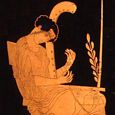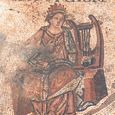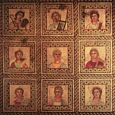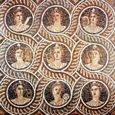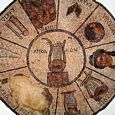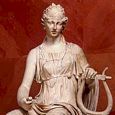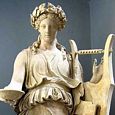TERPSIKHORE
Greek Name
Τερψιχορη
Transliteration
Terpsikhorê
Latin Spelling
Terpsichore
Translation
Delighting in Dance
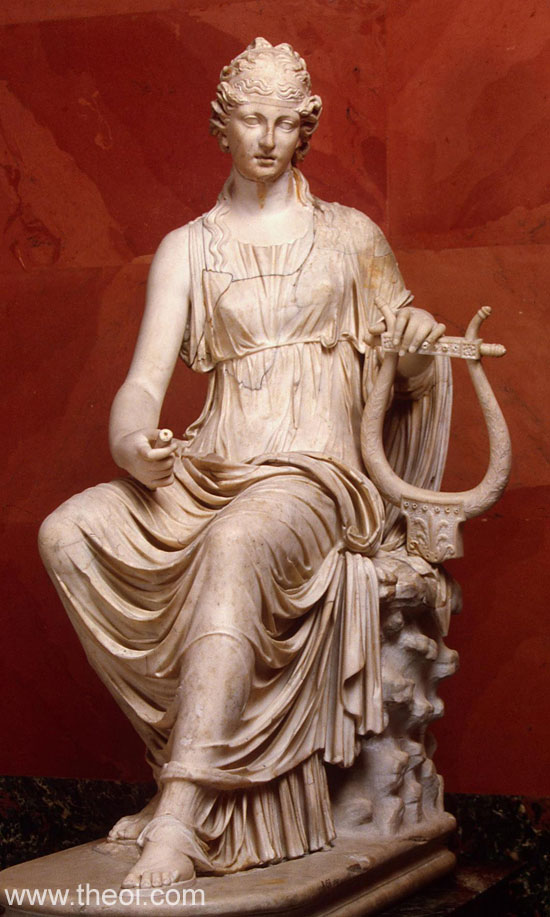
TERPSIKHORE (Terpsichore) was one of the nine Mousai (Muses), the goddesses of music, song and dance. In the classical era, when the Mousai were assigned specific literary and artistic spheres, Terpsikhore was named Muse of choral song and dancing, and depicted with a lyre and plectrum.
Her name means "Delighting in Dance" from the Greek words terpsis "to delight" and khoros "dance".
FAMILY OF TERPSICHORE
PARENTS
[1.1] ZEUS & MNEMOSYNE (Hesiod Theogony 75, Apollodorus 1.13, Diodorus Siculus 4.7.1, Orphic Hymn 76)
OFFSPRING
[1.1] THE SEIRENES (by Akheloios) (Apollonius Rhodius 4.892,
Nonnus Dionysiaca 13.313)
[2.1] LINOS (Pindar Dirges Frag 139)
[2.2] LINOS (by Apollon) (Suidas s.v.
Linos)
CLASSICAL LITERATURE QUOTES
Hesiod, Theogony 75 ff (trans. Evelyn-White) (Greek epic C8th or C7th B.C.)
:
"The Mousai (Muses) sang who dwell on Olympos, nine daughters begotten by great Zeus, Kleio (Clio) and
Euterpe, Thaleia (Thalia), Melpomene and Terpsikhore (Terpsichore), and Erato and Polymnia (Polyhymnia) and
Ourania (Urania) and Kalliope (Calliope)."
Pindar, Isthmian Ode 2. 6 ff (trans. Conway) (Greek lyric C5th B.C.) :
"Then the Mousa (Muse) [i.e. the poet] had not yet bowed to love of gain, or made herself a hireling
journeyman; nor in the market clad in masks of silver did honey-tongues Terpsikhore (Terpsichore) barter her
gentle-voiced and sweetly sun refrains. But now she bids us pander to that word the Argive spoke, to sadly near
to truth : ‘Money, money makes man.’"
Pindar, Dirges Fragment 139 (trans. Sandys) (Greek lyric C5th B.C.) :
"But in another song did three goddesses [Mousai (Muses)] lull to rest the bodies of their sons. The first
of these [Terpsikhore (Terpsichore)] sang a dirge over the clear-voiced Linos (Linus) [personification of the
lamentation song]."
Corinna, Fragment 655 (trans. Campbell, Vol. Greek Lyric IV) (Greek lyric C5th B.C.)
:
"Terpsikhore (Terpsichore) summons me to sing."
Plato, Phaedrus 259 (trans. Fowler) (Greek philosopher C4th B.C.) :
"When they [the grasshoppers] die they go and inform the Mousai (Muses) in heaven who honours them on
earth. They win the love of Terpsikhore (Terpsichore) for the dancers by their report of them."
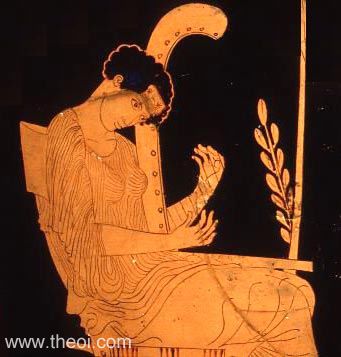
Pseudo-Apollodorus, Bibliotheca 1. 13 (trans. Aldrich) (Greek mythographer C2nd A.D.)
:
"Mnemosyne [bore to Zeus] the Mousai (Muses), the eldest of whom was Kalliope (Calliope), followed by Kleio
(Clio), Melpomene, Euterpe, Erato, Terpsikhore (Terpsichore), Ourania (Urania), Thaleia (Thalia), and
Polymnia."
Apollonius Rhodius, Argonautica 4. 892 ff (trans. Rieu) (Greek epic C3rd B.C.)
:
"The clear-voiced Seirenes (Sirens), Akheloos' (Achelous') daughters, used to bewitch with their seductive
melodies whatever sailors anchored there. Lovely Terpsikhore (Terpsichore), one of the Mousai (Muses), has borne
them to Akheloos, and at one time they had been handmaids to Demeter's gallant Daughter [Persephone], before she
was married, and sung to her in chorus."
Diodorus Siculus, Library of History 4. 7. 1 (trans. Oldfather) (Greek historian C1st
B.C.) :
"Hesiod even gives their names [the Mousai's (Muses')] when he writes : ‘Kleio (Clio), Euterpe, and
Thaleia (Thalia), Melpomene, Terpsikhore (Terpsichore) and Erato, and Polymnia, Ourania (Urania), Kalliope
(Calliope) too, of them all the most comely.’
To each of the Mousai (Muses) men assign her special aptitude for one of the branches of the liberal arts, such
as poetry, song, pantomimic dancing, the round dance with music, the study of the stars, and the other liberal
arts . . . For the name of each Mousa (Muse), they say, men have found a reason appropriate to her . . .
Terpsikhore (Terpsichore), because she delights (terpein) her disciples with the good things which come
from education."
Orphic Hymn 76 to the Muses (trans. Taylor) (Greek hymns C3rd B.C. to 2nd A.D.)
:
"Daughters of Mnemosyne and Zeus . . . Kleio (Clio), and Erato who charms the sight, with thee, Euterpe,
ministering delight : Thalia flourishing, Polymnia famed, Melpomene from skill in music named : Terpsikhore
(Terpsichore), Ourania (Urania) heavenly bright."
Nonnus, Dionysiaca 13. 313 ff (trans. Rouse) (Greek epic C5th A.D.) :
"The Seirenes (Sirens), whom rosy Terpsikhore (Terpsichore) brought forth by the stormy embraces of her
bull-horned husband Akheloos (Achelous)."
Suidas s.v. Linos (trans. Suda On Line) (Byzantine Greek lexicon C10th A.D.)
:
"Linos : Of Khalkis (Chalcis), [son] of Apollon and Terpsikhore (Terpsichore), but others [say] of
Amphimaros (Amphimarus) and Ourania (Urania), others of Hermes and Ourania."
ANCIENT GREEK & ROMAN ART
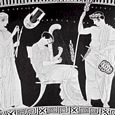
K20.6B Musaeus & Terpsichore
Athenian Red Figure Vase Painting C5th B.C.
SOURCES
GREEK
- Hesiod, Theogony - Greek Epic C8th - 7th B.C.
- Pindar, Odes - Greek Lyric C5th B.C.
- Pindar, Fragments - Greek Lyric C5th B.C.
- Greek Lyric IV Corinna, Fragments - Greek Lyric C5th B.C.
- Plato, Phaedrus - Greek Philosophy C4th B.C.
- Apollodorus, The Library - Greek Mythography C2nd A.D.
- Apollonius Rhodius, The Argonautica - Greek Epic C3rd B.C.
- Diodorus Siculus, The Library of History - Greek History C1st B.C.
- The Orphic Hymns - Greek Hymns C3rd B.C. - C2nd A.D.
- Nonnus, Dionysiaca - Greek Epic C5th A.D.
BYZANTINE
- Suidas, The Suda - Byzantine Greek Lexicon C10th A.D.
OTHER SOURCES
Other references not currently quoted here: Alciphron Letters 1.13, Scholiast on Euripides' Rhesus 346, Suidas Rhesos.
BIBLIOGRAPHY
A complete bibliography of the translations quoted on this page.
